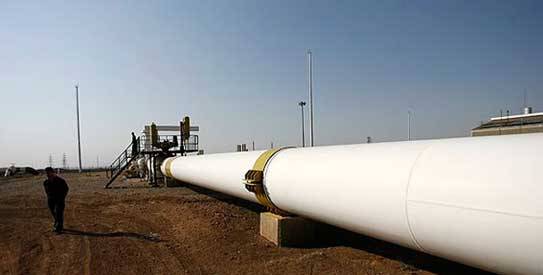On Wednesday the Prime Minister landed in Turkmenistan’s capital Ashgabat to begin his two-day visit of the country, after which he will also visit the adjoining Central Asian country of Kyrgyzstan. The premier’s travels are part of a larger effort to reach out to Asian countries, hoping to enhance bilateral cooperation and trade with each. While the prime minister is expected to sign several memorandums of understanding (MoUs) with the Turkmen president – along the same lines as the ones signed with Sri Lanka and Maldives – the more pressing concern is whether he can set the ball rolling on the Turkmenistan-Afghanistan-Pakistan-India (TAPI) gas pipeline; which has seen erratic progress and several false dawns.
The Prime Minister’s delegation – which includes Commerce Minister Khurram Dastagir Khan, Minister for Petroleum Shahid Khaqan Abbasi, and Minister for Water and Power Khawaja Mohammad Asif – suggests that the pipeline will surely be on the agenda. Having been stalled by Turkmen national law, which prohibits foreign companies from having an ownership stake in the resource field, and the dangers surrounding the pipe proposed path –which goes through Kandahar in Afghanistan and Balochistan in Pakistan – there have been recent breakthroughs that suggest that construction could start in 2015. With the improved security situation in the region, the project should be relatively safer; and Turkmen government with Total S.A have worked out a way around the legal restriction to begin the project.
The biggest motivator in this project is the fact the Gazprom, the Russian energy company, has halted imports from Turkmenistan, which now needs to diversify exports to other countries. TAPI remains the most viable diversification option and Pakistan should pursue the completion of the project on an expedited basis. Apart from catering to Pakistan’s energy needs, the project diversifies its economic activity; making it less reliant on China. Furthermore, the pipeline also strengthens regional cooperation and mutual dependence – key components of lasting peace. The Prime Minister, while continuing his present campaign of regional connectivity must focus on projects like this which lead to actual growth; rather than superficial, albeit useful, MOUs.
Friday, April 19, 2024
Restarting TAPI

US, UK unveil sweeping sanctions on Iran’s drone program
April 19, 2024
CNG prices to go up once again
April 19, 2024
Govt encouraging investments in ICT: Shaza
April 19, 2024
Appointed
April 19, 2024
Hepatitis Challenge
April 18, 2024
IMF Predictions
April 18, 2024
Wheat War
April 18, 2024
Rail Revival
April 17, 2024
Addressing Climate Change
April 17, 2024
Justice denied
April 18, 2024
AI dilemmas unveiled
April 18, 2024
Tax tangle
April 18, 2024
Workforce inequality
April 17, 2024
New partnerships
April 17, 2024
ePaper - Nawaiwaqt
Advertisement
Nawaiwaqt Group | Copyright © 2024





